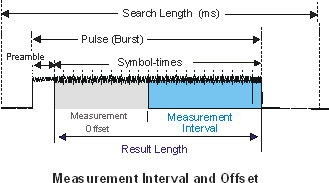Measurement Interval and Offset (802.11n/ac/ax/be/bn)
The and parameters define a specific interval of the for demodulation and analysis.
With this feature, specific time intervals of data can be quickly analyzed and viewed because the VSA does not acquire new measurement data when the measurement interval or offset is changed. When a new measurement interval or offset is entered, the VSA re-computes the trace data results using the existing measurement data.
The following illustration shows the interrelationship between the , Result Length, , and .

The trace shows only time data for the symbol-times specified by parameter, except when the is equal to . In this case, the trace also shows the preamble data. See Time trace data for complete details.
- Result Length: Total number of symbol-times included in the acquired and demodulated data.
- Maximum Result Length Sets the maximum number of symbol-times that can be included in the result length. limits the value to the number of symbol times within the pulse (or burst).
- Measurement Interval: Determines how much of the Result Length data is analyzed and displayed.
- Measurement Offset: Sets the start position of the within the Result Length.
- Symbol-time: One OFDM Orthogonal Frequency Division Multiplexing: OFDM employs multiple overlapping radio frequency carriers, each operating at a carefully chosen frequency that is Orthogonal to the others, to produce a transmission scheme that supports higher bit rates due to parallel channel operation. OFDM is an alternative tranmission scheme to DSSS and FHSS. symbol period which includes the IFFT Inverse Fast Fourier Transform/FFT Fast Fourier Transform: A mathematical operation performed on a time-domain signal to yield the individual spectral components that constitute the signal. See Spectrum. period (TFFT) and guard interval period (TGI Guard interval).
See Also
